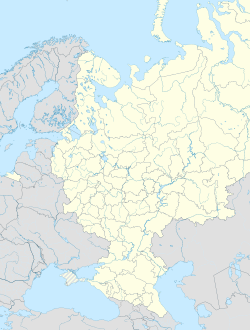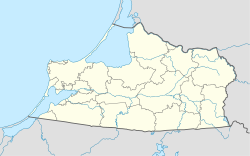Chkalovo (Kaliningrad)
| settlement
Tschkalowo
Enzuhnen (Rodebach) Чкалово
|
||||||||||||||||||||||
|
||||||||||||||||||||||
|
||||||||||||||||||||||
Tschkalowo ( Russian Чкалово , German Enzuhnen , 1938–1945 Rodebach ) is a place in the Russian Oblast Kaliningrad . It belongs to the local government unit Stadtkreis Nesterov in Nesterovsky District .
Geographical location
Chkalowo is located on the Rakowka ( Rodap ) river on a side road that runs near the Diwnoje Novoje (formerly Trakehnen ) station from the Russian trunk road A 229 (former German Reichsstrasse 1 , now also Europastrasse 28 ) between Gussew ( Gumbinnen ) and Nesterow ( Stallupönen , 1938 –1946 Ebenrode ) branches off in a southerly direction and leads via Jasnaja Poljana ( Groß Trakehnen ), Iljinskoje ( Kassuben ), Kalinino ( Mehlkehmen , 1938–1946 Birkenmühle ) to the east of the Rominter Heide , where it ends in the Russian-Polish border area to Saslonowo ( Szittkehmen / Schittkehmen , 1938–1946 fortified churches , Polish: Żytkiejmy) loses. In addition, Tschkalowo is connected with Ilyushino ( Milluhnen , 1938-1946 Mühlengarten ) and Tschistyje Prudy ( Tollmingkehmen , 1938-1946 Tollmingen ) by roads.
There is a rail connection via the Diwnoje Novoje station (formerly Trakehnen ) on the Kaliningrad – Nesterow railway line .
history
Until 1945 Enzuhnen was a village in the district of Stallupönen (1938–1946 district of Ebenrode ) in the administrative district of Gumbinnen in the Prussian province of East Prussia . In 1910 the estate and municipality of Enzuhnen had a total of 220 inhabitants.
On September 30, 1928, the Enzuhnen manor was incorporated into the rural community of Enzuhnen. In 1933, 229 people lived here, in 1939 there were 261. On June 3, 1938, Enzuhnen was renamed and given the name Rodebach .
As a result of the Second World War , Rodebach came under Soviet administration and in 1947 was given the Russian name Tschkalowo after the Soviet pilot Valeri Pavlovich Tschkalow . At the same time, the place became the seat of a village soviet in Nesterow Rajon . From 2008 to 2018 the place belonged to the rural community Ilyushinskoje selskoje posselenije and since then to the urban district of Nesterow.
Enzuhnen / Rodebach district
Between 1874 and 1945, Enzuhnen / Rodebach was the eponymous place and seat of an administrative district . It was formed on June 24, 1874 from ten rural communities and one manor district:
| Name (until 1938) | Name (1938-1946) | Russian name | Remarks |
|---|---|---|---|
| Rural communities : | |||
| Ackmonien | - | - |
1937 incorporated into Schluidschen |
| Bite | Bite | - | |
| To hear | Rodebach | Chkalovo | |
| Kubillehlen | Freieneck | Kusmino | |
| Kurplauken | Wildau | - |
1937 incorporated into Schluidschen |
| Noreitschen | - | - |
Incorporated in 1937 after vortex |
| Schluidszen, from 1936 Schluidschen |
Lerchenborn | - | |
| Trakehnen | Great Trakehnen | Yasnaya Polyana | |
| Wilken | Wilken | - | |
| Whirl | Whirl | - | |
| Manor : | |||
| To hear | - | - |
1929 incorporated into the municipality of Enzuhnen |
After the municipality of Enzuhnen was renamed, the Enzuhnen district was also given the new name "Rodebach District", which it kept until 1945. On January 1, 1945, the following seven municipalities formed this district: Bißnen, Freieneck, Lerchenborn, Rodebach, Trakehnen, Wilken and Wirbeln. Except for the places now called Chkalovo and Yasnaya Polyana, they no longer exist today.
Tschkalowski selski Sowet 1947–2008
The village soviet Chkalovsky selsky sovet (ru. Чкаловский сельский Совет) was established in June 1947. The administrative seat of the village soviet was initially the place Tschkalowo. Before 1975 the administrative headquarters were moved to Yasnaya Polyana . Before 1988, the administrative headquarters were then moved to Ilyushino . This place was initially included in the Prigorodny village soviet . After the collapse of the Soviet Union , the administrative unit existed as the village district of Tschkalowski selski okrug (ru. Чкаловский сельский округ). In 2008 the remaining places of the village district were incorporated into the newly formed rural community Ilyushinskoje selskoje posselenije.
| Place name | Name until 1947/50 | Remarks |
|---|---|---|
| Beloje (Белое) | Antsodehnen, 1938–1945: "Almen" | The place was renamed in 1950 and abandoned before 1975. |
| Bolshaya Dubrovka (Большая Дубровка) | Anderskehmen, 1938–1945: "Andersgrund" | The place was renamed in 1947 and abandoned before 1975. |
| Chutorskoye (Хуторское) | Gurdszen / Gurdschen, 1938–1945: "Schwichowshof" | The place was renamed before 1975. |
| Dalneje (Дальнее) | Szirgupönen / Schirgupönen, 1938–1945: "Amtshagen" | The place was renamed in 1950 and probably connected to the place Yasnaya Polyana before 1988. |
| Divnoye (Дивное) | Trakehnen station | In 1947 Trakehnen was renamed Diwnoje . Apparently he meant the village of Trakehnen, now part of Yasnaya Polyana . It is not known since when the former residence of the Trakehnen train station was called Divnoje. |
| Ilyushino (Илюшино) | Milluhnen, 1938–1945: "Mühlengarten" | The place was renamed in 1947 and was initially included in the Prigorodny village soviet. It became the administrative center before 1988. |
| Yasnaya Polyana (Ясная Поляна) | (Large) Trakehnen | The place was renamed in 1947 and was the administrative seat from before 1975 until before 1988. |
| Malaja Dubrowka (Малая Дубровка) | Bugdszen / Bugdschen, 1938–1945: "Klimmen" | The place was renamed in 1947 and abandoned before 1975. |
| Okhtinskoye (Охтинское) | Jonasthal | The place was renamed in 1950 and abandoned before 1975. |
| Rasdelnoje (Разделное) | Taukenischken, 1938–1945: "Belowsruh" | The place was renamed in 1950. It was apparently connected to Yasnaya Polyana or Chutorskoye. |
| Sernovoe (Зерновое) | Sodehnen, 1938–1945: "Heinsort" | The place was renamed in 1950 and abandoned before 1975. |
| Sibiryakovo (Сибиряково) | Kiddeln, 1938–1945: "Sonnenmoor" and Krausen | The place was renamed in 1950 and abandoned before 1975. |
| Smetanino (Сметанино) | Karszamupchen / Karschamupchen, 1938–1945: "Grünfließ" | The place was renamed in 1950 and abandoned before 1975. |
| Sosnovka (Сосновка) | Birkenwalde, Burgsdorfshof and Danzkehmen, 1938–1945: "Oettingen" | The places were renamed before 1975. |
| Sowchosnoje (Совхосное) | Mattischkehmen | The place was renamed in 1950. |
| Surkovo (Сурково) | Ackmonienen, 1938–1945: "Schilfbruch", Schluidszen / Schluidszen, 1938–1945: Lerchenborn and vertebrae | The places were renamed in 1950 and abandoned before 1975. |
| Svirskoye (Свирское) | Soginten | The place was renamed in 1950 and abandoned before 1975. |
| Chkalovo (Чкалово) | Enzuhnen, 1938–1945: "Rodebach" | The administrative headquarters until before 1975. |
| Vishnevka (Вишнёвка) | Budszedszen / Budschedschen, 1938–1945: Pfälzerwalde | The place was renamed in 1950 and abandoned before 1975. |
| Vorobyovo (Воробьёво) | Grünhof | The place was renamed in 1950 and abandoned before 1975. |
The town of Seljonoje (Grünhaus), renamed in 1947, and the two towns of Kubanskoje (Eyßeln and Neusorge) and Neschinskoje (Neu Kattenau) , which were renamed in 1950 , which were initially also included in the Tschkalowski selski Sowet, then (before 1975) became part of the village soviet Sawetinski selski Sowet .
church
Church building
The church in Enzuhnen was the fourth house of worship that was built after the settlement of the Stallupön region in 1608. It was badly damaged by the war and partly burned out. There is no trace of the church today.
Parish
The evangelical parish of Enzuhnen was separated from Pillupönen (1938–1946 Schloßbach , now Russian: Newskoje) in 1608 . It used to be called Groß Rudupehnen and it belonged to the Insterburg (Tschernjachowsk) inspection . In 1912 the church Soginten (Svirskoje) came from the parish Kassuben (Iljinskoje) to the parish Enzuhnen.
Until 1945 Enzuhnen (Rodebach) belonged to the church district Stallupönen (Ebenrode) in the church province of East Prussia of the Church of the Old Prussian Union .
During the time of the Soviet Union , church life in the village came to a standstill. In the 1990s, however, a new evangelical congregation was established in the village of Yasnaja Poljana ( Groß Trakehnen ), which used to belong to the parish . She joined the Kaliningrad provost in the Evangelical Lutheran Church of European Russia (ELKER) and is cared for by the pastors of the Salzburg Church in Gussew ( Gumbinnen ).
Pastor 1612–1945
From the founding of the parish until the end of the war in 1945, 17 Protestant clergy were in office in Enzuhnen (Rodebach). Karl Ferdinand Pszczolla († 1843) was a ministerial candidate and licentiate.
- Christoph Sappuhn, 1612–1657
- George Steinfeldt, 1656–1673
- George Petri, 1673-1688
- Johann Heinrich Arnoldi, 1685–1690
- N. Voglerus
- Johann Wilhelm Vorhoff, 1692–1709
- Johann Behrend, 1709–1711
- Daniel Reinhold Engellen, 1711–1725
- George Adam Meisner, 1725–1769
- Otto Thierbach, 1767–1804
- Johann Simon Kanning, 1804-1816
- Friedrich Wilhelm Rauschning, 1817–1856
- Johann Theodor Bernhard Gamradt, 1856–1872
- Karl Salomon, 1873–1885
- Karl Alexander Tiedtke, 1895–1911
- Max Dörr, 1911–1945
Individual evidence
- ↑ Itogi Vserossijskoj perepisi naselenija 2010 goda. Kaliningradskaya oblastʹ. (Results of the 2010 all-Russian census. Kaliningrad Oblast.) Volume 1 , Table 4 (Download from the website of the Kaliningrad Oblast Territorial Organ of the Federal Service for State Statistics of the Russian Federation)
- ↑ Uli Schubert, municipality directory
- ↑ Michael Rademacher: German administrative history from the unification of the empire in 1871 to the reunification in 1990. Landkreis Stallupönen (Ebenrode, Russian Nesterow). (Online material for the dissertation, Osnabrück 2006).
- ↑ There was obviously a confusion with the place Egglenischken, which was then renamed Repino.
- ^ Rolf Jehke, Enzuhnen / Rodebach district
- ↑ The Указ Президиума Верховного Совета РСФСР от 17 июня 1947 г. "Об образовании сельских советов, городов и рабочих поселков в Калининградской области" (Decree of the Presidium of the Supreme Soviet of the RSFSR of 17 June 1947: On the Formation of village Soviets, cities and workers' settlements in Kaliningrad Oblast)
- ↑ According to the decree, this village soviet should actually be set up in Egglenischken. On site, however, there was a swap with the village soviet Repinski who was then established there.
- ↑ According to the Административно-территориальное деление Калининградской области 1975 (The administrative-territorial division of the Kaliningrad 1975 published by Soviet the Kaliningrad) on http://www.soldat.ru/ (rar file). On a map from 1972, Chkalovo is still marked as the administrative seat.
- ↑ According to the Административно-территориальное деление Калининградской области 1989 (The administrative-territorial division of Kaliningrad, 1989 (with levels of 1988), published by Soviet the Kaliningrad) on http://www.soldat.ru/ (rar file)
- ↑ also on Sunday morning
- ↑ Friedwald Moeller, Old Prussian Protestant Pastor's Book from the Reformation to the Expulsion in 1945 . Hamburg 1968.
- ↑ a b Members of the Masovia Corps

